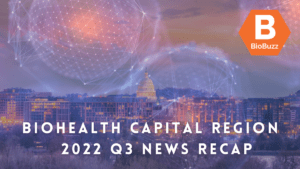
Vanderbilt Scientist Life’s Work Laid the Foundation for a Global Pandemic Prevention and Bioterrorism Center
Dr. James Crowe Jr. Discusses AHEAD100, the Infectious Disease Program Harnessing Monoclonal Antibodies to Get Ahead of the Next Pandemic
Dr. James Crowe Jr., Director, Vanderbilt Vaccine Center, Professor of Pediatrics and Pathology, Microbiology and Immunology, Ann Scott Carell Chair, and his team have spent the past decade preparing for the next global health epidemic.
Crowe recently joined BioHealth Innovation’s (BHI) BioTalk with Rich Bendis to discuss his career, the AHEAD100 program, and the potential creation of a groundbreaking, new research center within the BioHealth Capital Region (BHCR).
AHEAD100 is a research program focused on generating neutralizing antibodies for the 100 most likely causes of epidemics. The program discovers and validates monoclonal antibodies, also known as mAbs, that can target infectious diseases that have the most potential to cause the next pandemic. Crowe, a world-renown immunologist, leads a team of 50 that operates out of the Vanderbilt Vaccine Center, a state-of-the-art medical research facility at Vanderbilt University, where Crowe has spent the last 25 years.
Long before the novel coronavirus emerged, the Crowe Lab was hard at work uncovering pathogens and developing the tools needed to defeat them. In fact, Crowe’s development of two long-acting antibodies helped AstraZeneca develop its now approved SARS-CoV-2 vaccine, AZD7442.
The genesis of his work against COVID-19 began just as the COVID-19 pandemic was emerging. Crowe began a long-awaited sabbatical in Italy in February 2020.
Crowe stated, “Italy became the epicenter of this epidemic, and it sort of closed around me. I basically had to scramble out of the country with my wife on the last flight out of Rome on March 10. So it was pretty chaotic running my team…when I was supposed to be fully disengaged and doing strategic planning.”
“But we were in full-blown mode to find human monoclonal antibodies that would prevent or treat SARS-CoV-2. And we accomplished that goal. We finally obtained a really good sample on March 14. And 25 days later, we handed sequences to a pharma partner, in that case, AstraZeneca…So we were able to launch this ultra-fast discovery program, and deliver lead drug candidates to a pharma partner, and get into a clinic all within a couple of months. It was very gratifying.”
Crowe’s work on AHEAD100, as well as the work of some of his colleagues, had laid the foundation for the rapid and remarkable response to the COVID-19 threat. In his discussion with Bendis, Crowe likened academia and industry’s responses to COVID-19 to the first time a human ran a 4-minute mile.
“…People were so far away, and they got closer and closer. Finally, Bannister did it. And then within days or weeks, multiple people started running the four-minute mile…So I think our own group needs to think, ‘Four-minute mile’s over. That’s not the thing.’ We need to think, ‘What’s the next goal, technologically?'” he stated.
AHEAD100 is where Crowe and his team are reimagining what’s possible when it comes to fighting epidemics and pandemics. Now that industry has developed and moved vaccines through the regulatory process in less than a year, a whole new world is opening for infectious disease research and deployment.
“AHEAD100 has sort of become my life’s passion. I want this to happen, and I think it can happen, and it will happen. It should happen. I think the more people hear about the idea they see how much sense it makes. So I’ve lived through a number of epidemics in the last, say, 15 years, in which we’ve lived through a news cycle….People are really interested in something, and it dies out. So H5 bird flu. I think that was in ’95. There was the threat of bird flu, and that sort of died away. We’ve subsequently had another round of that with H7N9 started breaking out, and they killed all the birds, and that went away temporarily. We’ve also had SARS, the first SARS. We had Zika, Chikungunya, Ebola, and every time these things happen, our group would kick into high gear.”
“And we weren’t always 60-day capable, we were two-year capable. So we put all our efforts into making human monoclonal antibodies for one of these agents, and at the end of the two years, we have it. We have the golden ring. We’re ready to go. And the news cameras would show up at our place and say, ‘Hey, there’s a new outbreak. What have you done for that?’ We’re like, ‘Well, we want to talk to you about the last one because we just worked night and day to get the solution for the last one,’ said Crowe.
“And this happened to us so many times. I started thinking about what if instead of just getting faster and faster…what if we had these things ahead of time?”
To do this Crowe and his team set about aggregating potential pandemic agents from various research groups and came up with a list of 100 targets for which the program would develop mAbs in advance of an outbreak. Crowe began the work of identifying these 100 targets about five or six years ago.
“We had a pretty systematic process. We thought of all the antibodies that have already crossed over from animals or vectors into humans. We took out infections disease textbooks and looked at the index in the back…just make sure we’re covering everything. You can group viruses in particular into families. So Filoviruses, Ebola, and Marburg. Or Alphaviruses. You’ve got Eastern Equine and Chikungunya. So you can group them into families, and we did a systematic collection of things,” stated Crowe.
“We said…We’re going to get them all ahead of time, and when an outbreak occurs, we’re not going to be scrambling for eight, ten, twelve months to get the cure. We’ll just say, ‘We got that.’ We’re going to be prepared. And so that’s the Ahead100 program’s goal: to make antibody prevention and therapy lead molecules, down-select the leads, test them in Phase 1 trials, and be ready to escalate in the time of a pandemic,” he added.
Crowe stressed to Bendis that a program like AHEAD100 can only be realized through strong collaboration among government, academic, industry, non-profit organizations, and philanthropists.
Stu Solomon, the CEO of Connected DMV and an associate of both Crowe and Bendis, was instrumental in building momentum around AHEAD100 and gathering forces in the BioHealth Capital Region (BHCR) to take action on what had been learned during the pandemic. Solomon, the Task Force members, and Crowe began discussing the creation of a Global Pandemic Prevention and Bioterrorism Center located within the BHCR.
Crowe continued, “If you bring all those people together in a coordinated way, it’s like, win, win, win, win.”
The first steering committee meeting for the Global Pandemic Prevention and Bioterrorism Center convened on December 15, 2020. The steering committee is comprised of well-known, globally recognized experts that share Crowe’s vision for AHEAD100 and the proposed new center.
“It’s been a dream for so long to have people working on this together. But we’re kind of overstating that it’s only my dream. I think this is colliding with something that makes sense in the moment, and other people have been thinking about prevention and thinking we need to be proactive…I’m just joining a group, and threads are colliding,” stated Crowe.
Crowe continued, “Lots of people are showing up in one place who want a region to coordinate. They want government, academia, nonprofits, and corporate partners to work together. We just saw why we need that. COVID shows you that you can’t fix this stuff unless everybody’s working together…I feel like the historical time is now. This is when this is going to happen.”
BioBuzz will be following this developing story closely in 2021. Stay tuned.
- About the Author
- Latest Posts
Steve brings nearly twenty years of experience in marketing and content creation to the WorkForce Genetics team. He loves writing engaging content and working with partners, companies, and individuals to share their unique stories and showcase their work. Steve holds a BA in English from Providence College and an MA in American Literature from Montclair State University. He lives in Frederick, Maryland with his wife, two sons, and the family dog.





